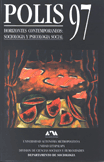Identidad social, televisión y cultura
Palabras clave:
identidad, comunicación, socialResumen
La televisión, por ser el medio de comunicación con mayor alcance en términos espacio-temporales. posee rasgos de suma importancia social y cultural. En virtud de que la mayor parte de los patrones de conducta se trasmiten a través del modelaje, resulta a todas luces interesante conocer hasta qué punto la gama de modelos que proporcionan los me- dios influye en términos de la creación y recreación de la identidad social. En este trabajo se revisan algunas de las características sociales de ese medio de comunicación masiva para conocer al mismo tiempo la forma como se relacionan los textos televisivos con la identidad social. Al efecto, se presenta una revisión de algunas de las principales teorías psicosociales sobre el desarrollo y la naturaleza de la identidad social. Se analiza el proceso de recepción para llegar finalmente a un planteamientio teórico sobre la relación que se establece entre la identidad social y los mensajes de la televisión en un proceso de creación y circulación de significados y placeres que normalmente ocurre.Descargas
Citas
Allport, G. W., “The nature of prejudice”, en The cognitive process, 1954, 10: 165, 177.
Bandura, A., Social foundations of thought and actions, Prentice-Hall, NUEVA Jersey, 1986.
Bandura, A, Aggression: A social learning analysis, Prentice-Hall, Englewood Cliffs, 1973.
Bandura, A, Psychological modeling: Conflicting theories, Aldine-Atherton, Nueva York, 1971.
Bandura, A. y R. H. Walters, Social Learning and Personality Development, Holt, Rinehart y Winston, Nueva York, 1963a.
Bandura, A., D. Ross y S. Ross, “Imitation of Film-mediated Aggressive Models”, en Journal of Abnormal and Social Psychology. Vol. 66, 1: 3-11, 1963b.
Benner, T., “Text and Social Process: the Case of James Bond”, en Screen Education, núm. 41, Winter/Spring, 1992.
Biddle, B. J., Role Theory, Expectations, Identities and Behaviors, Academy Press, Nueva York, 1979.
Brim. O. G y S. Wheeler, Socializations after childhood, 3a, edición, John Wiley y Sons, Inc., Nueva York, 1988.
Chomsky, N. y E. S. Herman, Manufacturing Consent, Pantheon Books, Nueva York, 1988.
Fiske, J. y J. Harley, “Reading Television”, en Fiske y Hartley, Reading Television, Methuen y Co. Itd, 1978.
Fiske, J. y J. Harley, “Critical Response: Meaningful Moments”, en Critical Studies in Mass Communication, 5: 3, 1988.
Freud, S., Fragment of an Analysis of a Case of Hysteria (Dora), Harmondsworth: Pelican Books, 1905.
Gaddy, Gary D., “Television’s impact on high school achievement”, en Public Opinion Quarterly, 50 (3): 340.359, 1986.
García-Canclini, N., Culturas híbridas, Grijalbo, México, 1989.
Geertz, C., The interpretation of cultures, Basic Books, Nueva York, 1973, pp. 3-30.
Gergen, K. J., The satured self, Basic Bokks, EUA, 1991.
Gilman, Sander, L., “Introduction: What are stereotypes and why use texts to study them?”, en Difference and pathology. Stereotypes of sexuality, race, and madness, Cornell, University Press, 1985.
Habermas, J., Communication and the Evolution of Society, Beacon Press, Canadá, 1979.
Holland, Norman N., The critical I, Nueva York 94 H64, 1992.
Holland, Norman N., Holland’s guide to psychoanalytic and literature and psychology, Oxford University Press Nueva York, 1990.
Holland, Norman N., The I, Yale University Press, Nueva York, 1985.
Holland, Norman N., 5 readers reading, Yale University Press, Nueva York, 1975.
Holmes, Paul, The inner world outside, Object relation theory and psychodrama, Tavistock/Routledge, Nueva York, 1992.
Johnson Laird, P. N., The computer and the mind. An introduction to cognitive science, Cambridge, Mass, Harvard University, Press. EUA, 1988.
Lacan, J., Television. A challenge to psychoanalytic establishment, W. W. Norton y Company, Nueva York, 1990.
Loot, Bernice, “Sexist discrimination as distancing behavior: II. Primetime television”, en Psychology of women quarterly, 1989, 13 (3): 341-355.
Martín Barbero, Jesús, De los medios a las mediaciones, ed. G. Gilli, México, 1987.
Miller, Thomas, W., “Identification process and sensory impact of children’s television programming on the preschool child”, en Child study journal, 1983, 13 (3): 203-207.
Moscovici, Serge, “The phenomenon of social representations”, en Far y Moscovici (eds.), Social representations, Cambridge University Press, 1984, pp. 3-70.
O’Connor, A., “Culture and communication”, en J. Downing, A. Mohammadi y A. Srebemy (comp.), Question the media, Sage Publication, Nueva York, 1990, pp. 27-41.
Páramo, T., “Avances teóricos en el estudio de las audiencias televisivas”, en Polis 96-2, UNAM-Iztapalapa, México, 1988.
Páramo, T., Telenovelas and social identity: A reception case study among Hispanics, mimeógrafo, (reporte sobre la tesis de doctorado), Austín Texas, 1977.
Pena, Sally, French, Judy y Judy Doerann, “Heroic fantasies: A cross-generational comparison of two children’s television heroes”, en Early childhood research quarterly, 1990, 5 (3): 393-406.
Petty y Cacioppo, Attitudes and persuasion: Classic and contemporary approaches, Dubuque, IA. Wm. C. Bronx, 1981.
Petty y Cacioppo, The elaborations likelihood model of persuasion advances in experimental social psychology, 1986, 19: 123-195.
Radway, J. A., “Identifying ideological seams: Mass culture, analytical method, and political practice”, en Communication, 1986, 9: 93-123.
Sherif, M., “An experimental approach of the study of attitudes”, Stoichiometry, I, 1935, pp. 90-98.
Sprafkin, J. N., K. D. Gadow y P. Grayson, “Television and the emotionally disturbed, learning disabled, and mentally retarded child: A review”, en Advances in learning and behavioral disabilities, 1984, 3: 151-213.
Tajfel, H., “Social categorization, social identity and social comparison”, en H. Tajfel (ed.), Differentations between social groups, Academic Press, Londres, 1978.
Weigel, Russell H. y Paul W. Howes, “Race relations on children’s television”, en Journal of psychology, 1982, 11 (1): 109-112.
Winett, Richard A., et al., “Effects of television modeling on residential energy conversation”, en Journal of applied behavior analysis, 1985, 18 (1): 33-44.



